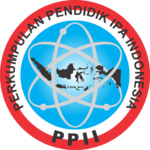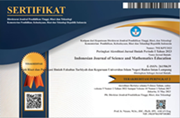Higher Order Thinking Skills (HOTS)-Based Students’ Worksheets in Thermodynamics Materials
Abstract
Keywords
Full Text:
PDFReferences
D. Yulianti, I. Pratiwi, and P. Dwijananti, “Membangun Karakter Siswa Melalui Model Pembelajaran Problem Based Instruction Berbantuan LKS Berpendekatan Scientific Materi Kalor dan Perubahan Wujud,” Unnes Phys. Educ. J., vol. 6, no. 2, 2017, doi: https://doi.org/10.15294/upej.v6i2.16077.
N. Andarika and H. Widowati, “Pengembangan Lembar Kegiatan Siswa (LKS) Berbasis Inkuiri Studi Kasus Pembelajaran di Kelas X SMAN 6 Metro Tahun Pelajaran 2013/2014,” J. Pendidik. Biol. Univ. Muhammadiyah Metro, vol. 5, no. 2, 2014, doi: http://dx.doi.org/10.24127/bioedukasi.v5i2.787.
G. Shilo and N. Ragonis, “A new approach to high-order cognitive skills in linguistics: problem-solving inference in similarity to computer science,” J. Furth. High. Educ., vol. 43, no. 3, pp. 333–346, 2019, doi: 10.1080/0309877X.2017.1361515.
R. Adawiyah and A. W. Wisudawati, “Indonesian Journal of Curriculum Pengembangan Instrumen Tes Berbasis Literasi Sains : Menilai Pemahaman Fenomena Ilmiah Mengenai Energi,” vol. 5, no. 2, pp. 112–121, 2017.
Karsono, “Pengaruh Penggunaan LKS Berbasis HOTS Terhadap Motivasi dan Hasil Belajar IPA Siswa SMP,” vol. 5, no. 1, 2017, doi: https://doi.org/10.21831/jpms.v5i1.13540.
A. J. Cañas, P. Reiska, and A. Möllits, “Developing higher-order thinking skills with concept mapping: A case of pedagogic frailty,” Knowl. Manag. E-Learning, vol. 9, no. 3, pp. 348–365, 2017, doi: 10.34105/j.kmel.2017.09.021.
A. Saregar, S. Latifah, and M. Sari, “Efektivitas Model Pembelajaran Cups: Dampak Terhadap Kemampuan Berpikir Tingkat Tinggi Peserta Didik Madrasah Aliyah Mathla’ul Anwar Gisting Lampung,” J. Ilm. Pendidik. Fis. Al-Biruni, vol. 05, no. 2, 2016, doi: 10.24042/jpifalbiruni.v5i2.123.
S. Özgelen, “Students’ science process skills within a cognitive domain framework,” Eurasia J. Math. Sci. Technol. Educ., vol. 8, no. 4, pp. 283–292, 2012, doi: 10.12973/eurasia.2012.846a.
G. A. M. Saido, S. Siraj, D. DeWitt, and O. S. Al-Amedy, “Development of an instructional model for higher order thinking in science among secondary school students: a fuzzy Delphi approach,” Int. J. Sci. Educ., vol. 40, no. 8, pp. 847–866, 2018, doi: 10.1080/09500693.2018.1452307.
A. Ghanizadeh, “The interplay between reflective thinking, critical thinking, self-monitoring, and academic achievement in higher education,” High. Educ., vol. 74, no. 1, pp. 101–114, 2017, doi: 10.1007/s10734-016-0031-y.
N. Baharin, N. Kamarudin, and U. K. A. Manaf, “Integrating STEM Education Approach in Enhancing Higher Order Thinking Skills,” Int. J. Acad. Res. Bus. Soc. Sci., vol. 8, no. 7, pp. 810–821, 2018, doi: 10.6007/ijarbss/v8-i7/4421.
A. Zohar and V. Alboher Agmon, “Raising test scores vs. teaching higher order thinking (HOT): senior science teachers’ views on how several concurrent policies affect classroom practices,” Res. Sci. Technol. Educ., vol. 36, no. 2, pp. 243–260, 2018, doi: 10.1080/02635143.2017.1395332.
B. Basuki, A. Doyan, and A. Harjono, “Pengembangan Alat Peraga Kotak Energi Model Inkuiri Terbimbing (Apkemit) sebagai Penunjang Pembelajaran Fisika SMA pada Materi Suhu dan Kalor,” J. Pendidik. IPA, vol. 1, no. 2, 2015.
U. Setyorini, S. E. Sukiswo, and B. Subali, “Penerapan Model Problem Based Learning untuk Meningkatkan Kemampuan Berpikir Kritis Siswa SMP,” J. Pendidik. Fis. Indones. (Indonesian J. Phys. Educ., vol. 7, 2011, doi: https://doi.org/10.15294/jpfi.v7i1.1070.
Giancoli, Fisika Edisi Kelima Jilid 1. Jakarta : Erlangga, 2001.
C. T. Noprinda and S. M. Soleh, “Pengembangan Lembar Kerja Peserta Didik (LKPD) Berbasis Higher Order Thinking Skill (HOTS),” Indones. J. Sci. Math. Educ., vol. 2, no. 2, pp. 168–176, 2019, doi: 10.24042/ijsme.v2i2.4342.
U. Pratiwi and E. F. Fasha, “Pengembangan Instrumen Penilaian HOTS Berbasis Kurikulum 2013 terhadap Sikap Disiplin,” J. Penelit. dan Pembelajaran IPA, vol. 1, no. 1, 2015.
S. Latifah and Ratnasari, “Pengembangan Modul IPA Terpadu Terintegrasi Ayat-Ayat Al- Qur ’ an pada Materi Tata Surya,” J. Penelit. Pembelajaran Fis., vol. 7, no. 20, 2016.
H. E. Vidergor, “Effectiveness of the multidimensional curriculum model in developing higher-order thinking skills in elementary and secondary students,” Curric. J., vol. 29, no. 1, pp. 95–115, 2018, doi: 10.1080/09585176.2017.1318771.
J. L. Docktor and J. P. Mestre, “Synthesis of discipline-based education research in physics,” Phys. Rev. Spec. Top. - Phys. Educ. Res., vol. 10, no. 2, pp. 1–58, 2014, doi: 10.1103/PhysRevSTPER.10.020119.
A. Sintia, D. Adila, P. Pendidikan, F. Universitas, and N. Malang, “Deskripsi Kesulitan Mahasiswa pada Materi Termodinamika,” vol. 2, pp. 92–97, 2017.
F. Alatas, “Peningkatan Keterampilan Proses Sains Mahasiswa Menggunakan Media Laboratorium Virtual Pada Matakuliah Termodinamika,” vol. 6, pp. 269–278, doi: https://doi.org/10.26618/jpf.v6i3.1434.
A. R. Sinensis, H. Firman, I. Hamidah, and M. Muslim, “Pengembangan Lembar Kerja Mahasiswa Berbasis Pemecahan Masalah Kolaboratif Berbantuan Simulasi Interaktif Pada Materi Termodinamika,” Pros. SNFA (Seminar Nas. Fis. dan Apl., vol. 3, p. 47, 2019, doi: 10.20961/prosidingsnfa.v3i0.28508.
R. Nabila and L. Hakim, “Pengembangan Lembar Kegiatan Peserta Didik (LKPD) Berbasis Higher Order Thinking Skills (HOTS) pada Mata Pelajaran Akuntansi Perbankan Syariah Kelas XI Semester I di SMK/MAK,” J. Chem. Inf. Model., vol. 53, no. 9, pp. 1689–1699, 2013.
W. Kurnia, Hidayati, and Ramli, “Pengaruh Penerapan Virtual Lab Berbantuan LKPD Menggunakan Model Pembelajaran Kooperatif Tipe Group Investigation Terhadap Kompetensi Peserta Didik Kelas XI SMAN 5 Padang,” vol. 10, pp. 161–168, 2017, doi: http://dx.doi.org/10.24036/2572171074.
DOI: http://dx.doi.org/10.24042/ijsme.v3i1.6082
Refbacks
- There are currently no refbacks.
Copyright (c) 2020 Unit Riset dan Publikasi Ilmiah FTK UIN Raden Intan Lampung

This work is licensed under a Creative Commons Attribution-ShareAlike 4.0 International License.

Indonesian Journal of Science and Mathematics Education is licensed under a Creative Commons Attribution-ShareAlike 4.0 International License.




